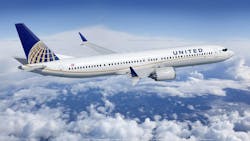Boeing Signals Confidence on 737 MAX Progress
While United Airlines has cleared its flight schedule of all 737 MAX flights through March 4, The Boeing Co. has offered a progress report on the flight-control programming revision for its troubled aircraft — including the possibility that the Federal Aviation Administration may issue an Airworthiness Directive during Q4 2019, reversing its earlier grounding order. That would further mean that 737 MAX deliveries to airline customers could begin in December, Boeing reported.
However, Boeing stressed the FAA and other regulatory authorities will determine the scheduled for the aircraft’s return to service within their respective jurisdictions. “This may include a phased approach and timing may vary by jurisdiction,” it stated.
Even so, Boeing explained it is working to gain final validation of updated training requirements for the aircraft, which must occur before commercial service may resume. And, it noted it expects this to begin in January.
The 737 MAX is twin-engine, narrow-body jet and the latest model of Boeing’s best-selling aircraft. It has been grounded worldwide and production and deliveries suspended since March 2019, following two fatal crashes that Boeing has determined were caused by the aircraft’s Maneuvering Characteristics Augmentation System (MCAS). MCAS is an "anti-stall" software meant to counter aerodynamic effects of the redesigned jets’ larger engines.
A revised MCAS has been developed and is undergoing review now, to be installed in the 385 aircraft in place with various carriers, and over 4,900 still in production or on order for future delivery.
Like United, American Airlines has cancelled 737 MAX flights through March 4 and Southwest Airlines, has cleared its schedule through March 6. Such postponements would mean roughly 12 months of lost service on the aircraft for the 50 airline customers that have taken delivery of the 737 MAX aircraft since Boeing made the aircraft available in 2017.
Recently, the European Air Safety Administration executive director Patrick Ky said that agency is on track to approve the narrow-body aircraft to resume commercial service in January, but that individual EU nations’ civil aviation authorities as well as the airline operators may require more time to implement the service resumption -- a point confirmed by Boeing in its report.
In that progress report, Boeing listed "five key milestones" that it must complete with the FAA before the 737 MAX may return to service:
1. FAA eCab Simulator Certification Session. This multi-day evaluation with the FAA to ensure the overall software system performs its intended function, both normally and in the presence of system failures, was completed earlier this month.
2. FAA Line Pilots Crew Workload Evaluation. This will be a separate, multi-day simulator session with airline pilots to assess human factors and crew workload under various test conditions.
3. FAA Certification Flight Test. In this step, FAA pilots will conduct certification flights of the final updated software.
4. Boeing Final Submittal to the FAA. After completing the FAA certification flight, Boeing will submit the final certification deliverables and artifacts to FAA, to support software certification.
5. Joint Operational Evaluation Board (JOEB) Simulator Training Evaluation. The JOEB is a multi-regulatory body that will conduct a multi-day simulator session with global regulatory pilots to validate training requirements.
After the JOEB simulator session, the Flight Standardization Board will release a report for a public comment period. That will be followed by the final approval of the training.
Boeing stressed that it has worked closely with the FAA and other regulators in this process. “We’re providing detailed documentation, had them fly in the simulators, and helped them understand our logic and the design for the new procedures, software and proposed training material to ensure that they are completely satisfied as to the airplane’s safety,” according to the statement.
